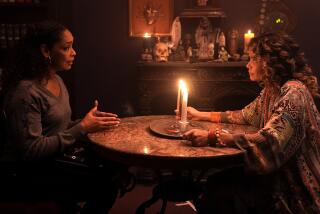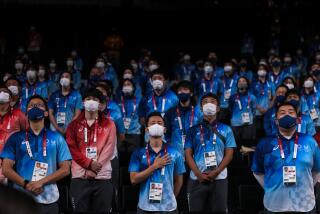Morning Finals Are Still Possible in Seoul Games
- Share via
An article in the International Olympic Committee’s official publication indicates that IOC leaders have not given up on the idea of morning finals at the 1988 Seoul Games.
The article, by French writer Roger Clement in the monthly “Olympic Review,” contends that morning finals would not be detrimental to the athletes, nor would they result in poorer times and performances.
Although the article is labeled “independent views,” articles differing from the leadership’s positions are seldom published by the IOC. This one also coincides with the recent announcement that Seoul’s negotiations with American television networks have been postponed for the fourth time, to late April.
The three major American networks--ABC, CBS and NBC--told both the Seoul organizers and the IOC months ago that their bids for the Seoul rights would be far lower without morning finals than with them. Morning in Seoul coincides with the previous evening’s prime viewing hours in the United States.
Last November, under pressure from British gold-medalist Sebastian Coe and other athletes, IOC President Juan Antonio Samaranch publicly reversed his earlier position in favor of morning finals and said that none would be held in Seoul.
Later, however, Samaranch indicated privately that he was not happy with that position because it might cost the Seoul organizers and the IOC hundreds of millions of dollars in TV payments.
Much of Clement’s article is devoted to citing examples from past Olympic Games that indicate that athletes competing in the morning have often had outstanding performances.
For instance, although acknowledging that the number of morning track and field finals have been minimal in the 21 Summer Olympic Games of the modern era, he noted that in the 1984 Los Angeles Games, both the women’s marathon and the men’s 50-kilometer walk took place in the morning.
“Long-distance runners are very keen on the benefits of evening races; nonetheless, Joan Benoit achieved, in spite of the heat at the end of the race, the second-best world performance of all time, and those immediately behind her also achieved excellent results,” Clement wrote.
Clement also cited examples of strong performances in morning heats--particularly by Wilma Rudolph in the 100- and 200-meter races at the 1960 Rome Games--concluding that there is no impediment to an athlete’s running superlatively in the morning.
The article quotes Seoul officials as saying that in the period of the 1988 Games, which are scheduled from Sept. 17 through Oct. 2, it is frequently “cool and pleasant” in the morning, “whereas the temperature and humidity level rise in the afternoon.”
Athletes are usually more annoyed by high humidity than by the time of day that they race, Clement said.
The thrust of the article is that it is important in the debate over morning finals “to avoid all prejudice and preconceived ideas . . . to research into all the evidence available” before deciding for or against the morning finals.
So far, two key international federations--track and field, and swimming--have taken stands against the morning finals. Track and field would have to shift its position to allow a comprehensive program of such finals. The American networks have indicated they don’t want to bid on Seoul without having a precise schedule of events in hand.
More to Read
Go beyond the scoreboard
Get the latest on L.A.'s teams in the daily Sports Report newsletter.
You may occasionally receive promotional content from the Los Angeles Times.






